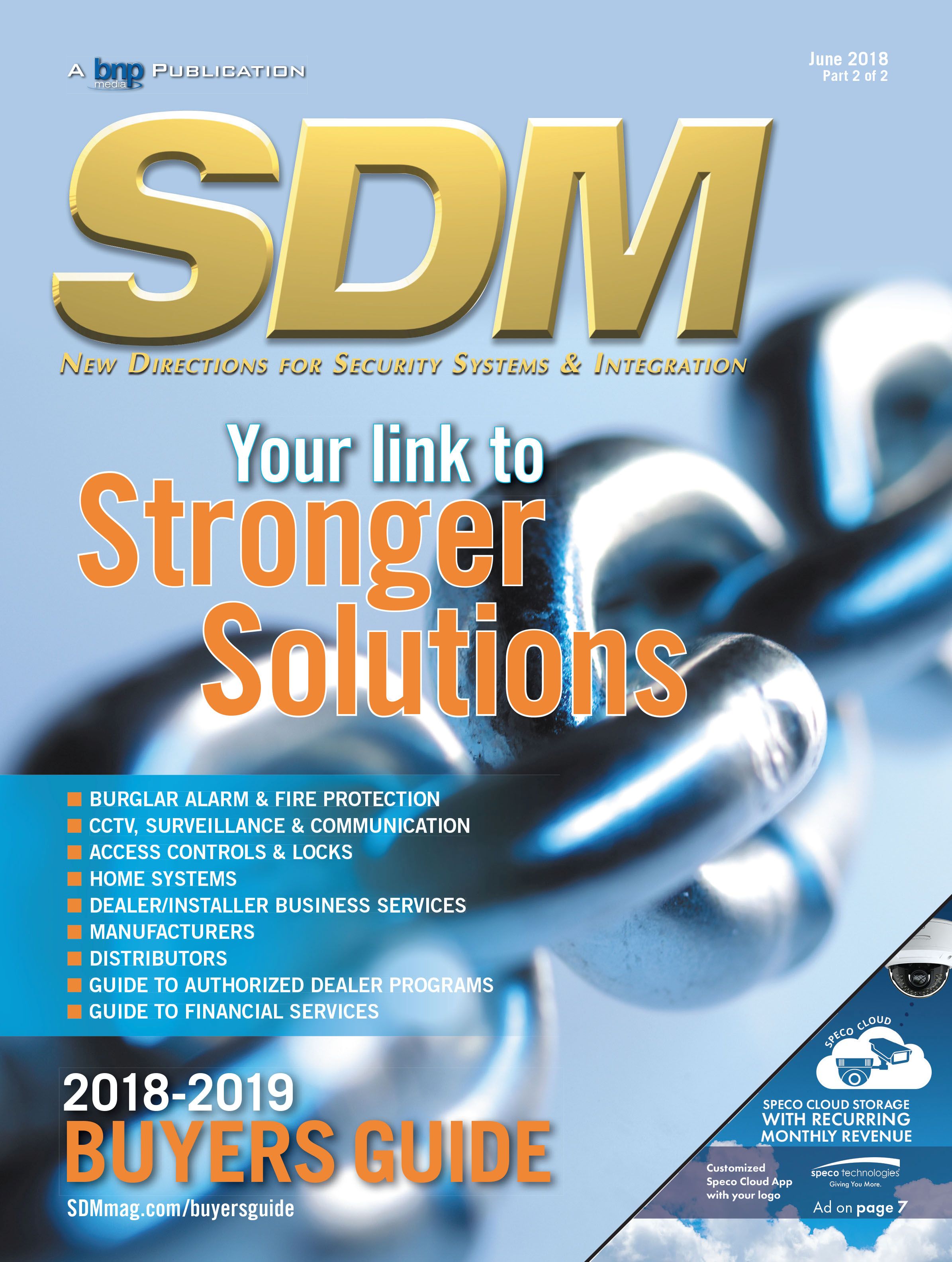What a year 2020 was! The security industry, both residential and commercial, rode a roller coaster and began a transformation. Lifestyles and work activities were turned upside down with the onslaught and wide spread of COVID-19. Work environments transitioned to home and people hunkered down in their houses to ride out the pandemic. Everything has become digital and internet connectivity is expected and just as important as water and electric utilities. Different priorities emerged, leading to requests for services and DIY products for personal security, home control, connectivity, health and well-being. Security industry opportunities exploded, and imploded, in 2020.
For security dealers, manufacturers, and service providers to survive, and hopefully thrive, during these tumultuous times they must take a proactive stance, understand what’s happening today and what’s coming, work hard at staying current, and change. The pandemic created new protocols to stay sat at work and on jobsites and finding qualified technicians is an ongoing problem too.
Last fall was Parks Associates’ eighth year completing its Residential Security Dealer Survey. The survey found: “The residential security industry has experienced the key conditions that disrupt markets as connectedness diffuses into nearly all U.S. homes, DIY systems available from retail mature, and players like NEST and Amazon enter the mix. Now, on top of adapting to these changes, the traditional sector must manage COVID-19 which inhibits in-home installation, places financial pressure on some customers, and requires careful handling of and help for company employees.”
Security is no longer thought of as just detection and protection, it has expanded to include video, access, home and building control, environmental monitoring, connectivity, analytics and alerts. Progressive security dealers offer many, if not most or all, of these products and services, and are constantly tracking trends to stay at the forefront.
Traditional security system sales and installation business are down, according to the Parks Associates survey, with 63 percent of dealers report selling fewer systems to date in 2020 than at the same time in 2019.
To offset this decline, it is important to be aware of current and potential trends and the opportunities they create. Every company should consider if any of the new market options align with their strategic plan and if yes, incorporate new items into their offerings.
Some of the most popular trends today include networked video cameras; smart door locks; video doorbells; other smart home devices; and DIY sales and support.
“With people staying home more, desire for security and peace of mind has created more interest in exterior protection and monitoring,” says Jennifer Kent, vice president of research, Parks Associates, Addison, Texas. “Increased sales of video cameras and smart doorbells have expanded DIY sales. Success can be attributed to flexible devices, relatively easy installation, and intuitive user interfaces.”
Developing Trends and Future Opportunities
One thing is certain, innovation is thriving and new ideas are rampant in the digital world. This march of technology is moving fast, and speeding up all the time, check out this quick 1-minute video. New products and services are only limited by the imagination. Given that the competitive field has flattened with connectivity around the world between any and all, literally anyone can take their ideas from conception to reality.
A crystal ball would help to know what things to focus on, put for now it’s worthwhile to track a wide range of new concepts and developments:
- New players in security with plug-and-play.
- 5G Cellular.
- Services for Multi-Dwelling-Units, MDU (Integrated Services).
- Smart Cities.
- Smart Retail (Digital Signage and Activity Monitoring).
- Asset Tracking.
- On-going Technical Support.
- Next Generation Service Contracts.
It may sound counter-intuitive, but DIY actually opens doors for security dealers as it can create new revenues through Do-It-With-Me, DIWM, or Do-It-Together, DIT. Here, the security dealer sells the DIY system, performs setup, delivers the programmed system components to the customer, and works with them to get it installed. Support often includes real-time chatting and video support.
As systems and products merge together, such as security, video, communications, lighting, and HVAC, things can get complicated. This issue of interoperability and the need for different apps for control of each system is now being addressed by some manufacturers.
For example, George Janelis, senior channel marketing manager at Resideo, Austin, Texas, says, “This problem is solved with the Resideo ProSeries Security and Smart Home Platform. It is a complete, end-to-end solution offering the same user interface on all methods of control — from the mobile app to wired and wireless touch screens. The modular approach addresses affordability by allowing dealers to select and include different capabilities such as Wi-Fi, Z-Wave, radio, and wireless takeover for past technologies. The AlarmNet360 Cloud Services and Solutions backend and video surveillance capability closes the deal with seamless installation and real-time data insights.”
Emerging Trends
With all of the changes happening today, new opportunities are emerging. Given the increased number of seniors, independent living safety and activity monitoring are more desired. The pandemic has created an awareness and strong interest in monitoring of air quality. With many businesses utilizing remote working, security and safety protocols are now important for small to medium businesses. Now, more than ever, cybersecurity is critical and its importance will only increase as the world is digital and connectivity is ubiquitous.
The count of aging individuals is rapidly expanding, creating new needs for safety and security with remote monitoring. According to the U.S. Census Bureau, the number of people over 65 will surpass those under 18 in less than 15 years — in 2034. With aging population growth, the market supporting independent living for seniors is growing exponentially.
Parks Associates says 46 percent of security firms offer independent living technologies and 60 percent offer Personal Emergency Response Systems (PERS).
To address the needs of the aging population, The Consumer Technology Association (CTA) created a new division focused on Health. Kinsey Fabrizio, vice president of membership at CTA, shares, “CTA has taken a leadership role in digital health, through our Health Division, digital health initiatives and industry standards focused on AI, digital therapeutics and value-based health care topics. We’re committed to convening innovative leaders, businesses and organizations to find and promote digital health solutions, improve patient outcomes and lower health care costs. Digital health had a strong presence at the all-digital CES 2021. And through the CTA Foundation, we support organizations using technology to better support seniors and people with disabilities.”
The American Association of Retired Persons (AARP) has been working hard for several years to serve their members. In 2019 AARP partnered with SimpliSafe. Their website is full of articles, checklists, and resources for independent living. The security industry is expanding to include aging-in-place with safety and notification.
Alarm.com offers Wellness, an independent living solution that integrates with Alarm.com’s robust ecosystem of connected devices. It identifies activity patterns, sends alerts if things seem out of the ordinary, and works with PERS pendants.
Marketing and Sales are Changing
It is no longer just about security and safety, it is personal and revolves around peace of mind, being connected, and knowing what’s happening in real-time. There’s a new type of relationship with customers, both current and potential. Here are some suggestions to build trust, close the sale, and develop a long-term relationship with customers:
- Share benefits that personally impact their lives (including for children).
- Be specific with how a device will help people in the home or small office.
- Emphasize innovation and proven technology.
- Stress financial value — resale value and specific savings.
- Offer clear product details and information.
- Offer bundles with financial savings or other promotions.
- Gather testimonials and references from trusted people.
“People are living longer and prefer to remain independent for as long as possible, intensifying concerns about caring for the growing number of aging adults living on their own,” says Steve Chazin, vice president of product management at Alarm.com, Tysons, Va. “Their safety, health and mental well-being is equally important to their happiness, and that’s where the unified Alarm.com platform and our Wellness solution really help. People benefit from our modern security technology and extend it to enable care and connection to the people that matter most, wherever they may live. … Everyone rests easier knowing they can check-in with loved ones at any time or receive alerts before something happens.”
Be aware when marketing and selling aging-in-place solutions, there are typically two purchasers; the parent who desires to live on their own, and their offspring who wants to know they are safe and secure, and definitely want notification of any anomalies in their parent’s routine.
Another emerging trend is water leak protection. Insurance companies have joined the market by partnering with security companies who deliver systems and services that will mitigate unwanted situations and costly repairs. Premiums may be lowered and credits given for being proactive with property protection and increased safety.
Smart speakers are also a popular technology right now. This year 50 percent of U.S. Homes will have at least one smart speaker and this can help security dealers. Smart speakers have the potential to be a gateway to other smart devices if strong use cases are presented and bundling with smart bulbs and thermostats can be used to introduce the smart home experience.
Future Possibilities
The Internet of Things, IoT, has exploded and is a part of everyday life. But with so many connected devices “talking” to each other, the chances for miscommunication and unwanted intruders grow. Cybersecurity is critical and numerous initiatives are addressing it. The mission of the ioXt Alliance (Internet of Secure Things) is to build confidence in IoT products through standardized and open security and privacy requirements and compliance programs.
Take a look back at SDM’s State of the Market: Smart Home 2019 article and you can see many of the predications have come true, even with the COVID-19 pandemic wild card. Here, Mitch Klein, executive director, Z-Wave Alliance, predicted DIY was going to create huge opportunities for security dealers.
Today it is doing just that, Klein says. “One of the biggest current opportunities for security companies is to secure the total smart home. Think more of yourself as a network management company that protects the security networks in a building. That doesn’t mean be an Ethernet expert; leave the IP network security to the IT specialist. Consider being responsible for installing and securing the security devices and their networks, including systems/networks for access control, security, fire protection, video surveillance, environmental control, and lighting.”
What Klein is saying, is to think outside-the-box and evolve security industry companies into smart network security for both physical and digital products and services.








